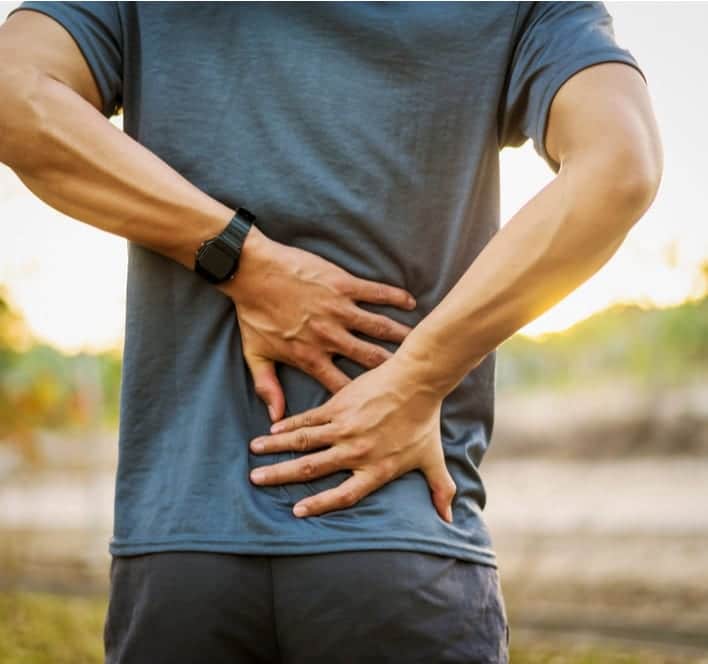Back pain can be extremely uncomfortable and difficult to manage. Most people choose to deal with their back pain by treating it with over-the-counter medications, ice packs, and rest—all of which only provide short-term pain relief. Whether your back pain is the result of an injury or overuse, there are a few adjustments and simple lifestyle changes you can implement to reduce or prevent your pain. Here are four simple yet effective back pain prevention tips.
Regular Exercise
Strengthening your core and the muscles in your back through regular exercise can help ease back pain, as well as prevent injury, enhance flexibility, and increase stability. You don’t need to lift heavy weights or run a marathon to make your back stronger. There are many other back exercises that you can do that will not only relieve back pain but also help you stay physically active in a safe way.
Stretching, walking, and swimming are low-impact exercises that can reduce tension in the muscles that support your spine. Even simple seated posture exercises such as lifting your arms up or squeezing your shoulder blades to your midline can increase blood flow, effectively reducing stiffness and relaxing the muscles in your back. To ensure you aren’t performing any harmful exercises, speak to a physician who specializes in treating back pain to build a safe exercise program for you.
A Healthy Weight for a Healthy Back
Excess body fat can put pressure on the spine, resulting in insurmountable pain. Overweight and obese individuals have an increased risk of developing severe back pain and tend to have a harder time staying physically active. The best way to prevent back pain is to maintain a healthy weight through a balanced diet. Consuming nutrient-dense foods loaded with vitamins, minerals, antioxidants, and fibers promote a healthy diet and can help you manage your weight. Some fresh foods you can incorporate into your diet include:
● Fruits
● Vegetables
● Lean meats
● Dairy products
● Whole grains
Highly processed foods and excessive amounts of alcohol, sugar, and caffeine can strain your nervous system, directly causing back pain. Your spine is vital to how your body functions and back pain can be debilitating. But don’t be overwhelmed: healthy eating habits can keep your body strong.
Good Sleeping Positions
The way you sleep can significantly affect your health. Poor sleeping positions can not only impact a good night’s sleep but also aggravate existing back pain. Investing in a high-quality mattress or adding a mattress topper for additional support can help you keep your spine in a neutral position. A spine specialist can identify the best sleeping position for you based on your condition and body type.
Generally, laying in a supine position—face up—is a natural way to ensure weight is equally distributed across the spine. Laying on your side is another good way to reduce joint and back pain, although it needs to be done correctly. Constantly laying on one side of your body can put pressure on the side of the body that you sleep on. Therefore, try alternating sides or adding a pillow between your legs to keep your body aligned. Also, try your best to avoid sleeping on your stomach, as it strains the neck and back. Remember that this may not be the case for you. Everyone’s back pain is unique and only an expert spine specialist can determine what’s best for you.
Proper Lifting Techniques
Whether you’re working out, moving homes, or working in a profession that requires you to lift heavy objects, make sure you are using proper lifting techniques. Lifting heavy objects incorrectly can put stress on the back and cause severe injury and pain. Here are some tips to properly lifting heavy objects:
● Stand close and center yourself to the object
● Keep your back straight, bend your knees, and squat down
● Get a strong grip on the object with both hands
● Tighten your abdominal muscles
● Use your leg muscles to lift
If you must lift heavy objects, try having someone help you and make sure to stretch your body beforehand. The biggest risk is not taking safety precautions when performing activities that involve heavy lifting.
Alleviate Back Pain with Minimally Invasive Procedures
Has your back pain become unbearable? If so, this might be a sign of a more serious underlying medical condition. If your pain persists, it is critical that you speak to an experienced spine specialist to receive a proper diagnosis and treatment plan. The award-winning medical team at NJ Spine and Orthopedics will work closely with you to help manage your symptoms and pain. Depending on your condition, undergoing one of our minimally invasive surgeries may be an appropriate option for you.
At NJ Spine and Orthopedics, we offer individualized care with state-of-the-art technologies in locations all throughout New York, New Jersey, and Florida. Connect with one of our health experts to find a solution to your needs, no matter how complex they may seem. Call (866) 272-9271 or complete a contact form to schedule a consultation in a location near you.

